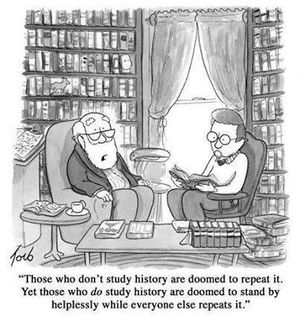History
history (История) is science that deals with notable events of the human civilization.
The recognition of importance of event, its significance and its influence on the latest events is not trivial. As in other sciences, in the case of doubts, the hypothesis are formulated; these hypothesis should allow the verification and the refutation.
In TORI, the historical concepts are suposed to satisfy the same 6 axioms as all other sciences, see TORI axioms; the use of logical variabes and the logics is assumed, although yet not all the colleagues agree that the classical logics and the TORI axioms can be applied to history. The critics of application of the axioms in non-natural sciences are available in Russian in articles Философия Ю and Философия Галагана.
Need for physics
July 2016, Matthew Stanley indicates that studying or history is necessary for physicists, and explains, why is it so. [1].
Revolution
The strongest historical events are wars and revolutions.
Up to century 21, the historic science is not yet so developed as physics or mathematics, and the historic predictions are non–accurate, so non-accurate, that it can be expressed with sentence Prediction of revolution is impossible. Many examples of predictions of revolutions in century 21 are collected in article Предсказания революций (In Russian); by year 2016, most of them just failed.
The definition of term Science implies that the scientific concept makes predictions, that allow, in particular, the refutation. Namely in this part, the historic science seems to be underdeveloped. Collection of descriptions of historical events and their interpretations, yet, does not lead to any universal scientific concept, that would allow accurate prediction of historical events. The best predictions (in particular, that of collapse of the USSR in century 20, the extension of the Putin world war to Ukraine), that happen to be successful, are only small islands in the ocean of predictions that fail.
Many predictions about Russia in century 21 are observed, in particular, about the Russia revolution. Such a predictions are observed especially frequently since the beginning of the Putin world war (2008); from year to year, the revolution is Russia is expected, predicted, roughly, "for the next year". Appearance of these prediction seem to be regular, repeated historical phenomenon. So, for the beginning of century 21, the scientific concept about revolution in Russia can be formulated in the following way:
Since 2008, every year, the new and new publications appear that predict revolution in Russia within one or two years.
This a prediction seems to be stable, it is confirmed every year. No other, alternative concept on the same subject is observed; so, such a concept should be qualified as scientific fact.
References
- ↑ http://scitation.aip.org/content/aip/magazine/physicstoday/article/69/7/10.1063/PT.3.3235 Matthew Stanley. Why should physicists study history? Physics Today, July 2016, page 38. .. The history of science can help dismantle the myth of the purely rational genius living outside the everyday world. .. Historian and philosopher Hasok Chang argues that science’s plurality of interpretations can make the history of science a resource for modern scientific research. He calls his approach complementary science—recovering forgotten and unsolved puzzles from the past. .. History teaches that knowledge is not fixed. Historical thinking involves asking incisive questions: Why did people in the past think that was true? Why do I think the opposite is true? ..
